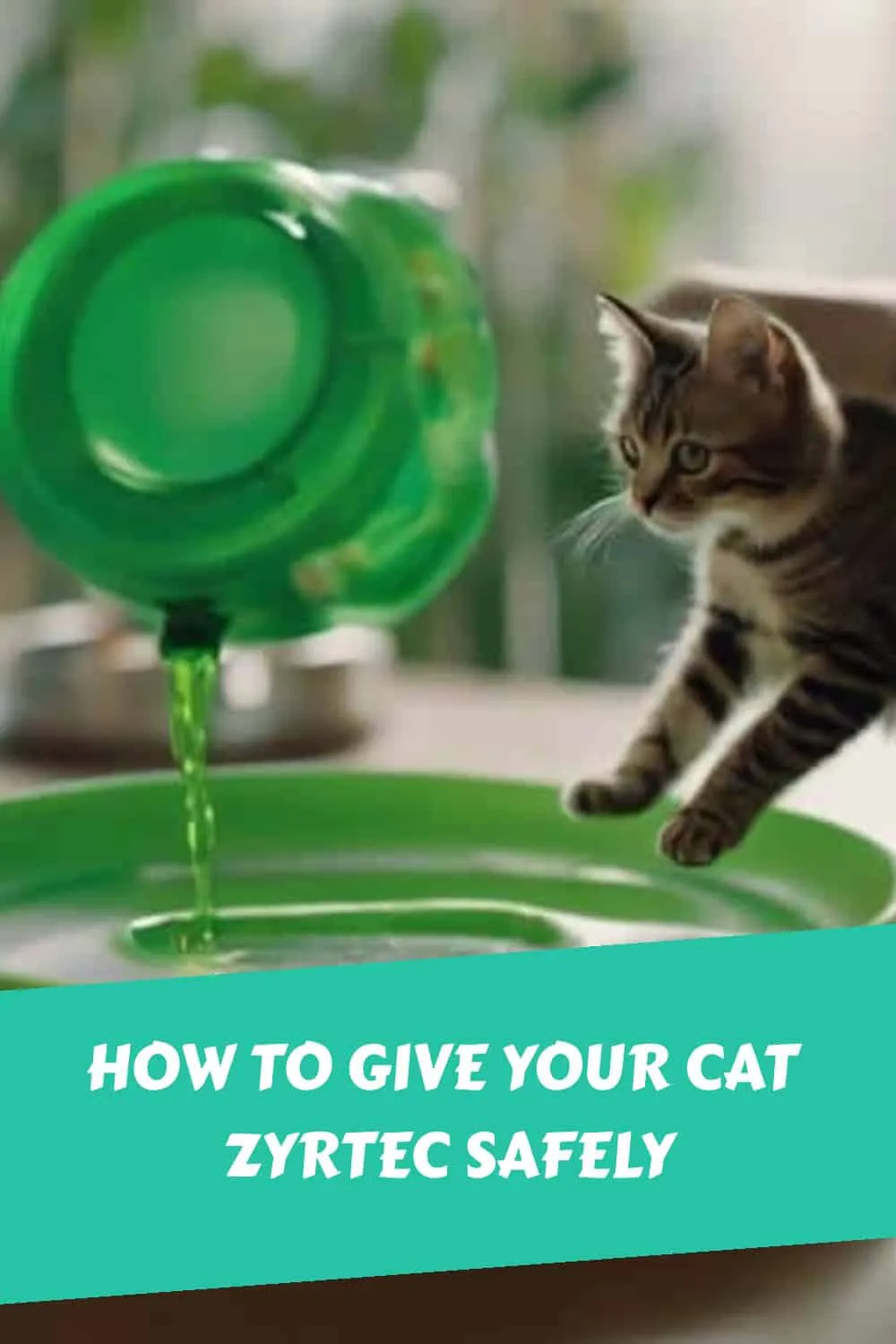The Best Fluffy Pancakes recipe you will fall in love with. Full of tips and tricks to help you make the best pancakes.

If you're considering giving your cat Zyrtec, it's like navigating a maze with potential pitfalls if not done correctly. Understanding how to safely administer this medication to your feline friend is crucial.
But before you start, there are essential aspects to consider to ensure your cat's well-being. Let's explore the necessary steps and precautions to take to make sure your cat benefits from Zyrtec safely and effectively.
Key Takeaways
- Consult vet for correct Zyrtec dosage based on your cat's needs
- Monitor for side effects like drowsiness, vomiting, or excessive drooling
- Watch for improvement in symptoms or adverse reactions post-administration
- Regularly communicate with your vet for guidance on Zyrtec administration
Proper Dosage for Cats
To ensure the safe administration of Zyrtec to your cat, it's crucial to establish the proper dosage based on their specific needs and condition in consultation with a veterinarian. The recommended dosage of Zyrtec for cats is 5 mg per day. It's essential to adhere to this dosage to prevent any potential adverse effects.
If needed, the dose can be split, but it's vital to use a pill cutter for accuracy when dividing the tablets. When selecting Zyrtec for your feline companion, opt for plain cetirizine and avoid Zyrtec-D, as the latter contains additional ingredients that may not be safe for cats. Purchase 5 mg tablets of plain Zyrtec to ensure the safe administration of the medication.
Consulting with a veterinarian is paramount in determining the correct dosage for your cat, taking into account their individual health needs and any specific conditions they may have.
Potential Side Effects of Zyrtec
Experiencing potential side effects from Zyrtec in cats can include drowsiness, excessive salivation, and vomiting. It's important to monitor your cat for any signs of these side effects when administering Zyrtec.
Here are some key points to keep in mind:
- Drowsiness: Watch for any unusual lethargy or sleepiness in your cat after giving Zyrtec, particularly if you have administered a higher dosage.
- Excessive Salivation: Some cats may drool more than usual when taking Zyrtec, which should typically subside within a day.
- Vomiting: In some cases, cats may vomit after being given Zyrtec. If this occurs, ensure your cat has access to water and monitor their condition closely.
- Digestive Upset: Be aware that digestive issues, such as diarrhea or constipation, can also be potential side effects of Zyrtec in cats.
Administering Zyrtec to Cats
After understanding the potential side effects of Zyrtec in cats, it's crucial to know the correct method for administering this medication to your feline companion. Zyrtec for cats usually comes in tablet form and the recommended dosage is approximately 5 mg per day.
You can give the tablet with or without food, depending on your cat's preference. If your cat happens to vomit after taking Zyrtec, try giving it with a small amount of food next time to see if that helps.
Remember, it's always best to consult your veterinarian before starting any medication regimen for your cat. Your vet can provide you with the proper dosage instructions tailored to your cat's specific needs and offer guidance on how to effectively administer Zyrtec.
Prioritizing your cat's health and well-being through proper medication administration is key to ensuring they receive the care they need.
Safety Precautions for Zyrtec Use
When giving your cat Zyrtec, it's essential to adhere to safety precautions to ensure their well-being and proper response to the medication.
- Safe to Use: Ensure that Zyrtec is safe to use in animals by consulting your veterinarian before administering it to your cat.
- Correct Dosage: Stick to the recommended dose of 5 mg per day to prevent any potential overdose or adverse effects.
- Proper Formulation: Use plain cetirizine tablets without pseudoephedrine or other additives to ensure the safety of your cat.
- Monitor for Reactions: Keep a close eye on your cat for any signs of adverse reactions like drowsiness, excessive salivation, or vomiting while they're on Zyrtec.
Monitoring Your Cat's Response
To effectively monitor your cat's response after administering Zyrtec, observe any changes in their symptoms closely for signs of improvement or adverse reactions. Keep a watchful eye for any itching or allergic reactions to see if Zyrtec is working effectively.
Look out for adverse reactions like excessive drowsiness, vomiting, or increased salivation, which may indicate a negative response to the medication. It's essential to document your cat's reaction to Zyrtec, noting any behavioral changes or shifts in symptoms.
If you notice any worsening of symptoms or concerning side effects, contact your veterinarian promptly for guidance. Regular communication with your vet is crucial to evaluate the safety and efficacy of Zyrtec for your cat.
Tips for Giving Zyrtec Effectively
To effectively give Zyrtec to your cat, consider using a pill cutter to accurately split the 5 mg tablet if necessary. When administering Zyrtec to your furry companion, there are several tips to keep in mind:
- Administer Carefully: Ensure you give the Zyrtec directly into your cat's mouth or mix it with a small amount of food to make it easier for them to consume.
- Ensure Full Dosage: Make sure your cat swallows the Zyrtec tablet completely to guarantee they receive the full dosage intended for their treatment.
- Monitor Closely: After giving Zyrtec to your cat, closely monitor them for any adverse reactions or side effects that may occur.
- Consult a Professional: It's always advisable to consult your veterinarian for specific guidance on how to safely and effectively give Zyrtec to your cat.
Managing Zyrtec Allergies in Cats
Consider using a pill cutter to ensure precise dosing when managing Zyrtec allergies in your cats. This tool can help you accurately split Zyrtec tablets, especially when dealing with smaller doses for cats. When giving Zyrtec to your feline friend, it's crucial to monitor them for any adverse reactions or side effects. Keep an eye out for symptoms such as excessive drowsiness, vomiting, or diarrhea, and contact your vet if you notice any concerning signs.
Zyrtec Allergy Management Table
| Dosage | Frequency | Monitoring |
|---|---|---|
| Vet-recommended dose | Once a day | Watch for side effects |
| Split tablets as needed | Every 24 hours | Observe behavior |
| Adjust based on vet advice | Daily | Track allergic reactions |
Zyrtec and Cat Health Considerations
When considering the health of your cat in relation to Zyrtec, it's crucial to be aware of the potential side effects and the importance of proper dosing guidelines. Zyrtec (cetirizine) is commonly used in cats to alleviate itching caused by allergies, parasites, or infections. However, like any medication, there are essential health considerations to keep in mind:
- Proper Dosage: Ensure you follow the correct dosing guidelines provided by your veterinarian to prevent under or overdosing.
- Side Effects: Cats may experience side effects such as drowsiness, excessive salivation, or vomiting when taking Zyrtec. Monitor your cat closely for any adverse reactions.
- Long-Term Use: Long-term Zyrtec use in cats should be supervised by a vet to ensure both safety and effectiveness.
- Consultation: If you notice any worsening symptoms or unexpected side effects in your cat while administering Zyrtec, seek advice from your veterinarian promptly.
Being mindful of these health considerations will help you give your cat Zyrtec safely and effectively.
Consulting Your Vet Before Zyrtec Administration
Before giving your cat Zyrtec, it's crucial to consult your veterinarian first.
Your vet will assess if Zyrtec is suitable and determine the correct dosage for your cat's specific needs.
Vet's Approval Essential
Seeking your veterinarian's approval is crucial before administering Zyrtec to your cat to ensure their safety and well-being. Your vet plays a key role in determining the appropriate use, dosage, potential side effects, and interactions related to Zyrtec for your feline companion. Here are some important points to consider when consulting your vet:
- Your vet will advise on the correct dosage of Zyrtec based on your cat's weight, age, and health status.
- Discuss any potential side effects that may occur and any interactions with other medications your cat is currently taking.
- Your vet can guide you on monitoring your cat's response to Zyrtec and when to seek further medical attention if necessary.
- Following your vet's instructions diligently will ensure the safe and effective use of Zyrtec for your cat's allergies or itching problems.
Safety First Always
Ensure the safety and well-being of your cat by consulting your veterinarian before administering Zyrtec. Your vet will determine the right dosage based on your cat's weight, health, and symptoms. It's crucial to discuss any potential side effects or interactions with other medications. Follow your vet's guidance closely to maximize benefits and minimize risks. Regularly observe your cat for any unusual reactions or changes in behavior after starting Zyrtec, and promptly inform your vet of any concerns. Below is a table highlighting key points to consider before giving your cat Zyrtec:
| Consulting Your Vet Before Zyrtec Administration | |
|---|---|
| Discuss Dosage | Ensure the correct Zyrtec dosage for your cat. |
| Drug Interactions | Inquire about potential interactions with other medications. |
| Monitor Side Effects | Watch for any adverse reactions or changes in behavior. |
| Follow Vet's Instructions | Adhere to your vet's administration guidelines. |
| Prompt Communication | Notify your vet of any concerns or unusual reactions. |
Frequently Asked Questions
How Do I Get My Cat to Take Zyrtec?
To get your cat to take Zyrtec, try pill administration tricks like hiding it in wet food. For feline allergies, explore treatment options. Follow dosing tips for feline medication. Ensure cat health and provide allergy relief.
How Fast Does Zyrtec Work in Cats?
Zyrtec typically kicks in for cats within 1-2 hours, alleviating allergy symptoms like itching and sneezing. If no improvement is seen after a few hours, consult a vet. Individual response and the cause of the reaction can influence Zyrtec's efficacy.
How Do You Give a Cat an Allergy Pill?
To give a cat an allergy pill, consider feline dosages. Utilize pill hiding techniques like mixing the pill in wet food. Look for allergy symptoms in your cat to determine the need for medication for feline allergies.
Can Zyrtec Be Crushed?
Yes, Zyrtec can be crushed for easier administration to cats. By crushing the medication and mixing it with wet food, you can ensure accurate dosing and effective delivery. Consult your vet for dosage adjustments and potential side effects.
Conclusion
In conclusion, giving your cat Zyrtec safely involves following proper dosage guidelines, monitoring for potential side effects, and consulting with your veterinarian for guidance.
By administering Zyrtec correctly and being attentive to your cat's response, you can help alleviate allergy symptoms and improve their overall health and well-being.
Remember to always prioritize your cat's safety and seek professional advice when in doubt.










